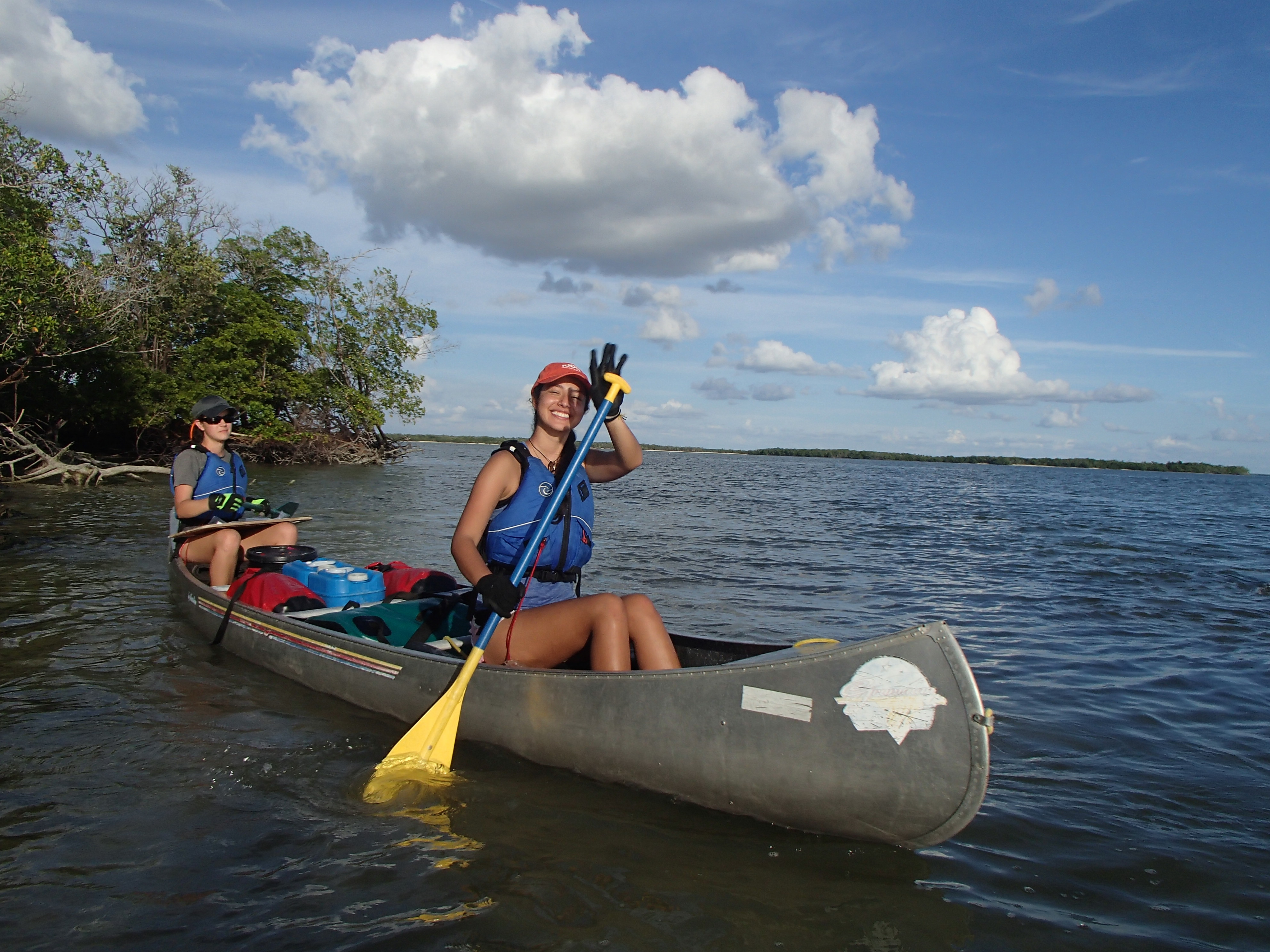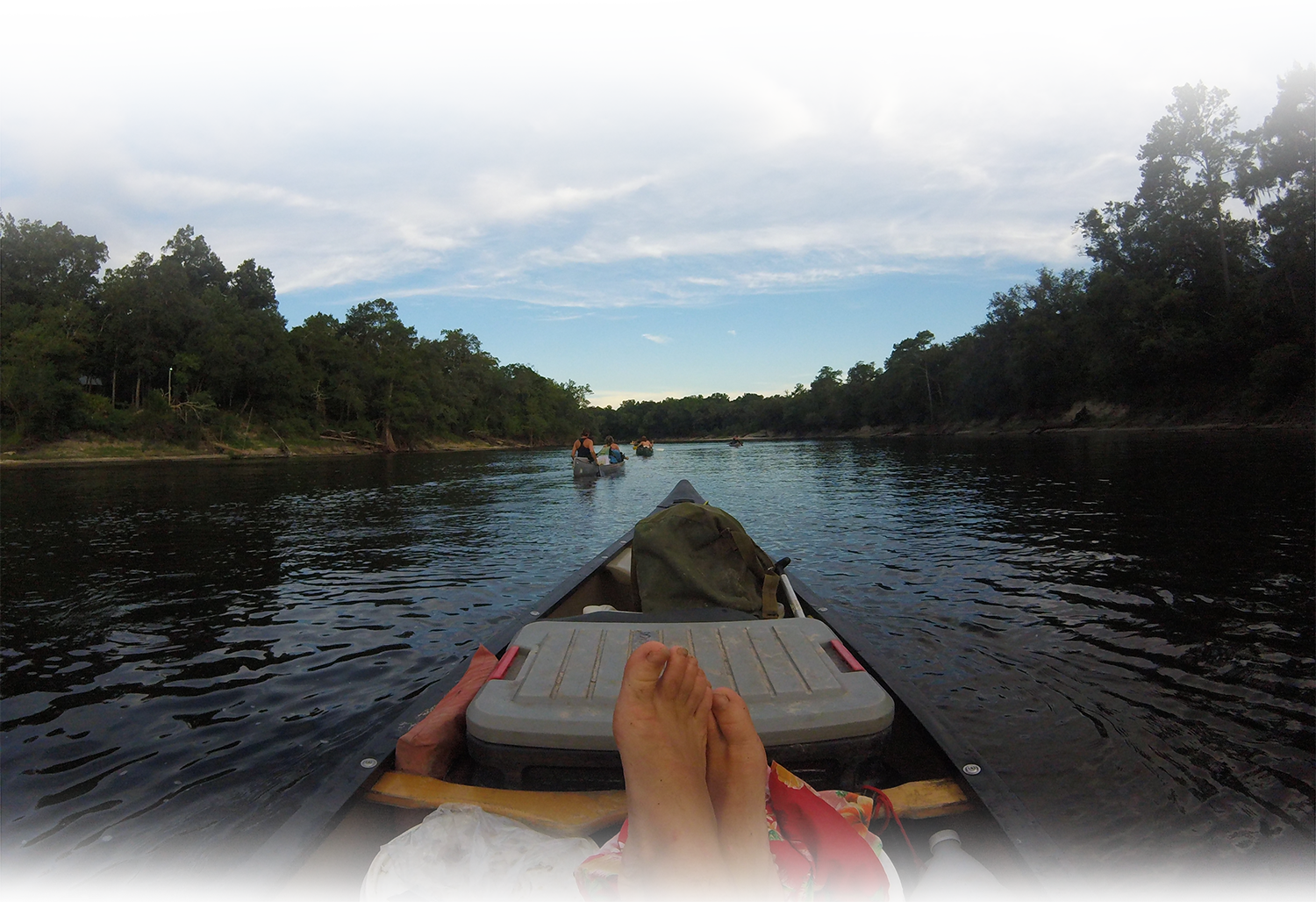Central Rivers of Florida

Central Florida is home to some of the country’s most historic and biologically diverse waterways. It offers paddling on small, winding canoe trails as well as larger rivers and lakes, with camping in a variety of environments from hardwood hammock forests to barrier islands.
The Suwannee River, Ocklawaha River, and St. John’s River offer hundreds of miles of paddling in some of the country’s most unspoiled wilderness. On Central Florida’s east coast, the Indian River Lagoon, which encompasses Merritt Island National Wildlife Refuge and Canaveral National Seashore, is the most diverse estuary in North America. Nearly one third of the nation’s manatee population resides in this 156 mile-long waterway, along with an abundance of dolphins and other marine life.
These rivers support diverse ecosystems including freshwater springs, swamps, sandy beaches, hardwood hammocks, and salt marshes. Abundant wildlife including cranes, pelicans, egrets, otters, turtles and dolphins thrive in these environments.
These regions are the ancestral lands of the Seminole, Timucua, Tocobaga, Calusa and Ais nations.


CANOEING
During this journey, students will complete an extended canoe expedition. This course includes learning the art of paddling a canoe in a variety of water conditions as well as orienteering, expedition planning and Leave No Trace wilderness living. Students will be paddling with a partner; they must learn to work together and communicate effectively to navigate a variety of waterways such as lakes, rivers, and swamps.

What about insects?
Like any wilderness course, there will be insects. Our tenured instructors will have plenty of advice and experience to share with you about self-care to maintain your comfort and safety.
Professionals who work and live in the outdoors agree that the best way to protect yourself from biting insects, bugs and sunburn is the physical barrier of clothing. Therefore, we emphasize that you bring the required clothing and gear listed. We suggest white or light colored, loose fitting clothes to keep you cooler, and to avoid short shorts so that your skin is not exposed to the elements. Our tents are fully enclosed and include netting so wildlife and insects are not able to enter.
Outward Bound courses also emphasize self-reliance and responsibility. While our instructors will be there to guide you along the way, you should be prepared to follow directions and monitor your personal care as well.
Canoeing in summer seems like it might be hot?
Florida summers provide opportunities for students to learn transferrable self-care skills and build character as they learn how to live and work together in a new and challenging environment.
Again, self-care is an important part of course that will be taught and practiced. When expeditioning in warmer temperatures, staying hydrated maintains your comfort and safety. In addition to water, we drink fluids with electrolytes. Your instructors emphasize drinking regularly before you feel thirsty to be proactive and you and your crew remind one another of that. Wearing loose fitting, light-colored clothing is also strongly encouraged and as appropriate, instructors will set aside time for refreshing dips and swims!
Why canoeing?
Our Florida canoeing courses provide opportunity for students to acquire crucial teamwork and communication skills as they learn how to work together to achieve common goals. Using two person canoes, you paddle with a fellow crewmate in a group setting while being coached and encouraged by your instructors. We provide ample time for you to practice these skills and achieve individual and group success as you progress and accomplish goals. Through this experience, you learn important skills for life, such as self-confidence, compassion, trust and the ability to lead. Upon return home, students can truly go Outward Bound by approaching future challenges with new skills, grit and determination.
Is canoeing the only activity?
During this canoe expedition, students venture into our Central Florida course area without the interruptions and distractions of transports or transition days. While it may seem that canoeing could be monotonous, no two days at Outward Bound are the same; weather, group dynamics and our educational progression provide continuous opportunities for challenges and successes. In addition to canoe skills training (paddle strokes and techniques, water safety, communicating with a partner to paddle, and equipment use, care and maintenance) you also learn to read navigational charts, practice Leave No Trace principles, identify wildlife, set up camp and cook in the outdoors. Our courses also include a two-to-three-day solo, two-to-three days of service and a final challenge run.
What about the alligators?
At Outward Bound, we co-exist peacefully with the wildlife, including alligators, in our course areas. Typically, alligators are shy and avoid humans. Reports of dangerous alligators are usually cited near canals or along popular roadways where there are human food sources. We expedition in the backcountry, away from areas where alligators may be accustomed to being around humans and being fed by them.
Safety is our priority. Outward Bound instructors receive regular training in the activities and environments in which we deliver our courses. They are trained to anticipate and manage risks inherent in remote areas. We have had no incidents or injuries because of alligators. We teach campcraft skills including proper food and trash storage to avoid wildlife accessing our campsites for food. Our tents are fully enclosed and include netting so wildlife and insects are not able to enter. Staff teach students how to be aware of their surroundings and watch for signs of wildlife. When we spot wildlife, we observe, take a photo (if we are quick enough!), identify it and move on as to not disturb. We never attempt to interact with wildlife and park officials keep us updated about closures or advisories due to wildlife or environmental hazards.





